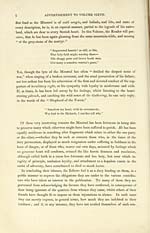Glen Collection of printed music > Printed music > Scotish minstrel > Volumes 4-6
(235) [Page 1]
Download files
Complete book:
Individual page:
Thumbnail gallery: Grid view | List view
![(235) [Page 1] -](https://deriv.nls.uk/dcn17/9134/91346167.17.jpg)
ADVERTISEMENT TO VOLUME SIXTH.
The Editors of the Scotish Minstrel intimated, in an Advertisement prefixed
to the Fifth Volume, that their collected materials were far from being exhausted,
and, at the same time, announced their intention to add another Volume to the
Work. This they have now accomplished, and they flatter themselves, that, in
point of interest and in value, it will lose nothing by a comparison with those
which have preceded it. They have no longer to contend with many of the dis-
advantages which they experienced at the commencement of their labours ; the
distance of Mr Smith from Edinburgh, for instance, which rendered the necessary
communication with him at once difficult and troublesome, having been obviated
since his continued residence on the spot. Had they in like manner enjoyed the same
advantage throughout the whole of the previous Volumes, they are confident they
would not now have occasion to apologize for some occasional, although trivial,
errors which had escaped their notice during the course of the publication.
Should they, however, be called upon, at any after period, to send forth an im-
proved edition of the Scotish Minstrel, they trust they will be enabled not merely
to free it from being liable to such a charge, but, in many other respects, to render
it still more deserving of the favourable regard which it has so liberally expe-
rienced, and to put it in competition with any existing Collection of the Melodies
of Scotland.
As it seems as natural for Editors to say something for themselves, when about
to take leave of the Public, as it is customary to bespeak its favour, they will
avail themselves of this opportunity to say a few words in behalf of their favourite
Minstrel. Like all his brethren, he is delighted with the layes of former times,. —
of which, among other ferly things,
" Some be of war and some of wo,
Some of joy and mirth also,
And some of treachery and of guile,
And old adventures that fell the while,
And many there are of fayrie,
But most of love forsooth there be."*
" See the introductory lines to the curious old legend, entitled Lai le Freine, composed by
Marie de France, about the year 1240, of which there is an English translation of nearly a coeval
date, familiar to the lovers of old metrical romance.
The Editors of the Scotish Minstrel intimated, in an Advertisement prefixed
to the Fifth Volume, that their collected materials were far from being exhausted,
and, at the same time, announced their intention to add another Volume to the
Work. This they have now accomplished, and they flatter themselves, that, in
point of interest and in value, it will lose nothing by a comparison with those
which have preceded it. They have no longer to contend with many of the dis-
advantages which they experienced at the commencement of their labours ; the
distance of Mr Smith from Edinburgh, for instance, which rendered the necessary
communication with him at once difficult and troublesome, having been obviated
since his continued residence on the spot. Had they in like manner enjoyed the same
advantage throughout the whole of the previous Volumes, they are confident they
would not now have occasion to apologize for some occasional, although trivial,
errors which had escaped their notice during the course of the publication.
Should they, however, be called upon, at any after period, to send forth an im-
proved edition of the Scotish Minstrel, they trust they will be enabled not merely
to free it from being liable to such a charge, but, in many other respects, to render
it still more deserving of the favourable regard which it has so liberally expe-
rienced, and to put it in competition with any existing Collection of the Melodies
of Scotland.
As it seems as natural for Editors to say something for themselves, when about
to take leave of the Public, as it is customary to bespeak its favour, they will
avail themselves of this opportunity to say a few words in behalf of their favourite
Minstrel. Like all his brethren, he is delighted with the layes of former times,. —
of which, among other ferly things,
" Some be of war and some of wo,
Some of joy and mirth also,
And some of treachery and of guile,
And old adventures that fell the while,
And many there are of fayrie,
But most of love forsooth there be."*
" See the introductory lines to the curious old legend, entitled Lai le Freine, composed by
Marie de France, about the year 1240, of which there is an English translation of nearly a coeval
date, familiar to the lovers of old metrical romance.
Set display mode to: Large image | Transcription
Images and transcriptions on this page, including medium image downloads, may be used under the Creative Commons Attribution 4.0 International Licence unless otherwise stated. ![]()
| Special collections of printed music > Glen Collection of printed music > Printed music > Scotish minstrel > Volumes 4-6 > (235) [Page 1] |
|---|
| Permanent URL | https://digital.nls.uk/91346165 |
|---|---|
| Description | Advertisement to Volume Sixth. |
| Shelfmark | Glen.217a |
|---|---|
| Additional NLS resources: | |
| Attribution and copyright: |
|
| Description | Scottish songs and music of the 18th and early 19th centuries, including music for the Highland bagpipe. These are selected items from the collection of John Glen (1833 to 1904). Also includes a few manuscripts, some treatises, and other books on the subject. |
|---|
| Description | The Glen Collection and the Inglis Collection represent mainly 18th and 19th century Scottish music, including Scottish songs. The collections of Berlioz and Verdi collected by bibliographer Cecil Hopkinson contain contemporary and later editions of the works of the two composers Berlioz and Verdi. |
|---|

